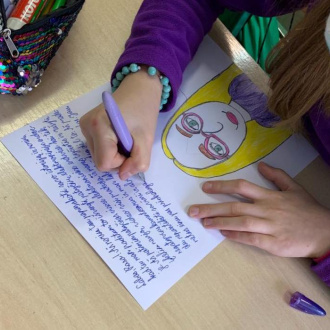Difficult childhood (poverty, violence, rejection, incompatibility) is a frequent topic of literary works read at school. We used literary characters to increase students' awareness of the problems that children often face. Immersed in the destinies of literary characters, students think about important topics, develop empathy, look for ways to solve problems.
This activity consists of several steps. In the first phase, students choose one child from the books they have read and write an essay according to the teacher's requirements. They should imagine themselves in the role of the chosen character and describe his / her life, characteristics and feelings by writing in the I form. Then students have to imagine the physical appearance of the chosen hero and create his avatar using some web tools.
Students place their works on an interactive collaboration board so that they are accessible to everyone. After that, the students are given the next task. Staying in the chosen role, students write a letter to another hero, expressing empathy, comparing experiences or giving advice to solve a problem. The final step is the reading of all the essays and the class discussion. The students peer-evaluate their work, and draw conclusions.
This activity is strongly integrated into the curriculum. Students develop reading and writing skills, analyze literary characters, learn how to write a letter, practice peer assessment. The most important part of this activity is that, thinking about literary characters, students compare them with their own experiences, notice that there are peers with similar problems, they develop empathy or better understanding of peers who live in difficult circumstances and face problems. In this way, literature classes can help to enhance students' social and emotional skills and promote an inclusive attitude among peers.
This workshop was developed with sixth grade students, but can be adapted to older and younger students, depending on the literary works taught in other grades. Also, the activity can be modified and instead of using web tools, students can draw characters, as performed by the Lithuanian team.
88% of the participants agree that the workshop made them think about whether some of their friends had similar problems.
